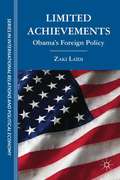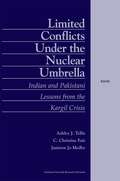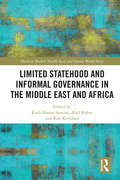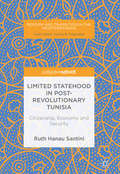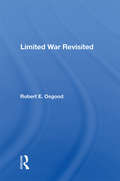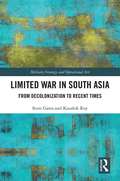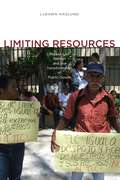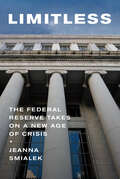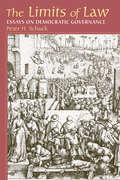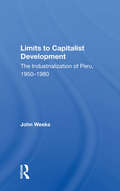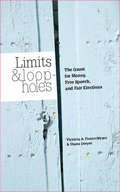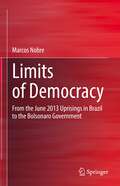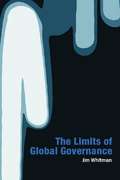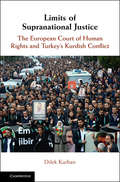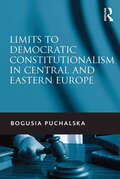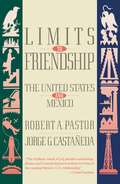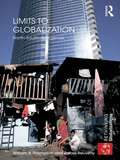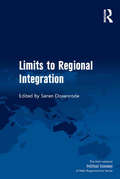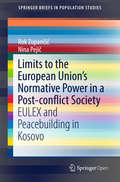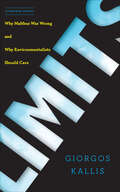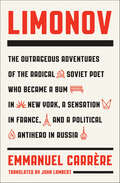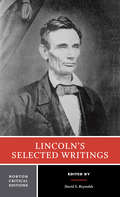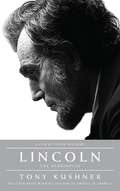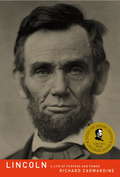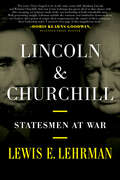- Table View
- List View
Limited Achievements: Obama’s Foreign Policy (The Sciences Po Series in International Relations and Political Economy)
by Zaki LaïdiThrough an analysis of the general principles of Obama's foreign policy, LaIdi shows how Obama has charted a realist course in the Middle East, in Europe, in diplomacy, and in war.
Limited Conflicts Under the Nuclear Umbrella: Indian and Pakistani Lessons from the Kargil Crisis
by C. Christine Fair Jamison Jo Medby Ashley J. TellisThis report examines the views of India and Pakistan on the significance of Pakistan's foray into the Kargil-Dras sector in a limited war that has come to be known as the Kargil conflict. The goal of the analysis is to assess both combatants' perceptions of the crisis, with a view to evaluating the possibilities of future Kargil-like events and the implications of the lessons each country learned for stability in South Asia. The analysis is based almost exclusively on Indian and Pakistani source materials. The Kargil crisis demonstrated that even the presence of nuclear weapons might not appreciably dampen security competition between the region's largest states. However, the question remains of whether or not the Kargil war represents a foretaste of future episodes of attempted nuclear coercion if India and Pakistan believe that their nuclear capabilities provide them the immunity required to prosecute a range of military operations short of all-out war.
Limited Statehood and Informal Governance in the Middle East and Africa (Durham Modern Middle East and Islamic World Series)
by Ruth Hanau Santini Abel Polese Rob KevlihanHybrid forms of governance – where the central state authority does not possess a monopoly of violence and fails to exercise control – are not only an epiphenomena, but a reality likely to persist. This book explores this phenomenon drawing on examples from the Middle East and Africa. It considers the different sorts of actors – state and non-state, public and private, national and transnational – which possess power, examines the dynamics of the relationships between central authorities and other actors, and reviews the varying outcomes. The book provides an alternative view of the way in which governance has been constructed and lived, puts forward a conceptualisation of various forms of governance which have hitherto been regarded as exceptions, and argues for such forms of governance to be regarded as part of the norm.
Limited Statehood in Post-Revolutionary Tunisia: Citizenship, Economy And Security (Reform and Transition in the Mediterranean)
by Ruth Hanau SantiniThis book explores the complexity of the only widely-acclaimed successful democratic transition following the Arab uprisings of 2010-2011 – the Tunisian one. The country’s transformation, in terms of state-society relations across several analytical dimensions (citizenship, security, political economy, external relations), is looked at through the prism of statehood and of limited statehood in particular. The author illustrates how the balance of power and the relationship between the state and societal forces have been shaped and reshaped a number of times at key critical junctures by drawing on examples from very different policy arenas. The critical reading of statehood speaks beyond the Tunisian case study as notions of limited statehood can be applied, with different degrees of intensity and in some dimensions more than others, to most political systems in the Middle East and North Africa. Accessible for students, academics and professionals alike, the book illuminates the complexities and challenges of a successful, albeit still fragile, transition.
Limited War Revisited
by Robert E. OsgoodThe strategy of limited war has transformed the American approach to the use of force and played a key role in U.S. foreign policy since World War II. As the mainstay of containment it was designed to deter and fight wars effectively at a tolerable cost and risk in the nuclear age by providing the United States with a flexible and controlled response to a variety of military threats. The strategy met a severe challenge in the Vietnam war; it has nevertheless continued to prevail as a doctrine, if not necessarily with its former utility, by adapting to the changing domestic and international environment after Vietnam. Robert E. Osgood critically examines the success, ambiguities, and flaws of the strategy in its expanding application to postwar military policy. He interprets its impact on the Vietnam war and vice versa, extends his analysis to the new challenges posed by changes in technology and the military balance that affect U.S. security, and concludes with a searching inquiry into the problems of limited war where its utility as an instrument of foreign policy is now most in doubt: the Third World.
Limited War in South Asia: From Decolonization to Recent Times (Military Strategy and Operational Art)
by Kaushik Roy Scott GatesThis book examines the origins, courses and consequences of conventional wars in post-colonial South Asia. Although South Asia has experienced large-scale conventional warfare on several occasions since the end of World War II, there is an almost total neglect of analysis of conventional warfare in the Indian subcontinent. Focusing on China, India and Pakistan, this volume, therefore, takes a unique approach. Regional rivalries between India and Pakistan are linked with global rivalries between the US and USSR (later Russia) and then China, and war is defined in a broader perspective. The book analyses the conduct of land, sea and air warfare, as well as the causes and consequences of conflicts. Tactical conduct of warfare (the nature of mobile armoured strikes and static linear infantry combat supported by heavy artillery) and generalship are studied along with military strategy, doctrine and grand strategy (national security policy), which is an amalgam of diplomacy, military strategy and economic policy. While following a realpolitik approach, this book blends the development of military strategies and doctrines with the religious and cultural ethos of the subcontinent’s inhabitants. Drawing on sources not easily accessible to Western scholars, the overall argument put forward by this work is that conventional warfare has been limited in South Asia from the very beginning for reasons both cultural and realpolitik. This book will be of much interest to students of South Asian politics, security studies, war and conflict studies, military studies and International Relations in general.
Limiting Resources: Market-Led Reform and the Transformation of Public Goods (G - Reference, Information and Interdisciplinary Subjects)
by LaDawn HaglundThe provision of public goods such as education, electricity, health, sanitation, and water used to be regarded as primarily the responsibility of governments, but in the 1980s privatization of such services spread and reliance on market mechanisms instead of governments became common in many parts of the world, including developing countries. The record of the past twenty-five years of market-led development, however, has not been encouraging. Not only has it failed to improve public services significantly, but it has also undermined democratic institutions and processes, reproduced authoritarian relations of power, and suppressed alternatives made possible by an increasing global acceptance of the importance of economic and social rights. In Limiting Resources, LaDawn Haglund seeks an understanding of public goods that can better serve the needs of people in developing countries today.Haglund critiques the narrow conception of public goods used in economics, which tends to limit the range of resources considered “public,” and proposes an expanded conception drawing from multiple disciplines that incorporates issues of justice, inclusion, and sustainability. She then uses case studies of electricity and water provision in Central America to illuminate the conditions for success and the causes of failure in constructing adequate mechanisms for the supply of public goods. She follows with an analysis of political conflicts over privatization that reveals how neoliberal policies have made effective state action difficult. The book concludes with suggestions for ways in which this reformulated conception of public goods can be applied to promote justice, sustainability, and economic and social rights in developing countries.
Limitless: The Federal Reserve Takes on a New Age of Crisis
by Jeanna SmialekThis fascinating deep dive into one of the most powerful and least understood American institutions—the Federal Reserve—is &“a riveting narrative...[and] an invaluable guide to the monetary policy debates of the last few years" (Liaquat Ahamed, Pulitzer Prize-winning author of Lords of Finance).&“The best book on the Fed in our time and a model of financial writing.&” –KirkusThe marble halls of the Federal Reserve have always held secrets; for decades the Fed did the utmost to preserve its room to maneuver, operating behind the scenes as much as possible. Yet over the past two decades, this elite world of bankers and economists speaking a language that only monetary experts could understand has been forced to change its ways. Amid rising inequality, weakening global economic prospects, and a pandemic, the central bank has entered into a new era of transparency and activism that has changed its role in modern society in subtle but remarkable ways.Limitless tells the inside story of this deeply impactful transformation, and what it means for ordinary Americans. Focusing on characters such as the Fed chairman Jerome Powell; the Vice Chair for Supervision Randal Quarles; Vice Chair Lael Brainard; the Minneapolis Fed president Neel Kashkari; and the long-ago Fed Chair Marriner S. Eccles—and driven by the rising tension between Main Street and Wall Street—this is a page-turning account of the modern Fed&’s inner workings during a crucial inflection point in history.
Limits Of Law: Essays On Democratic Governance
by Peter SchuckLaw is an increasingly pervasive force in our society. At the same time, however, the obstacles to laws effectiveness are also growing. In The Limits of Law, Yale law professor Peter H. Schuck draws on law, social science, and history to explore this momentous clash between laws compelling promise of ordered liberty and the realistic limits of its capacity to deliver on this promise. Schuck first discusses the constraints within which law must worklaws own complexity, the cultural chasms it must bridge, and the social diversity it must accommodateand proceeds to consider the ways law uses regulatory, legislative, and adjudicatory processes to influence social behavior. He shows how politics shapes regulation, how regulation might incorporate individualized equity, and how it can best be reformed. Turning to legislation, he justifies a strong role for special interest groups, dissects the anatomy of purely symbolic statutes, and defends broad delegations of legislative power to regulatory agencies. On adjudication, Schuck analyzes the courts efforts to advance social justice by controlling federal agencies, constitutionalizing politics, managing mass toxic tort disputes, and reforming public services and institutions. His concluding chapter draws together some general lessons about laws limits and possibilities for improving democratic governance.
Limits To Capitalist Development: The Industrialization Of Peru, 1950-1980
by John WeeksDr. Weeks presents a detailed critique of dependency theory as an explanation of underdevelopment and offers an alternative theory based on the internal contradictions within underdeveloped countries and the competitive nature of international capitalism. Applying his theory to Peru, he shows how the country has been transformed over the last thirt
Limits and Loopholes: The Quest for Money, Free Speech, and Fair Elections
by Victoria A. Farrar-Myers Diana DwyreFrom the authors of Legislative Labyrinth: Congress and Campaign Finance Reform.Elections, the basic mechanism of representative democracy, should be untainted by corruption and provide a platform for free speech. But running for office takes money—a lot of it, usually—which means campaign finance has become a pitched battle over the fundamental political values of free speech versus fair elections. With insiders' perspectives, Farrar-Myers and Dwyre tell the story of what it took to pass campaign finance legislation, provide analysis of the subsequent court action, and explore the regulatory and electoral outcomes of reform efforts. Limits and Loopholes is a story about incremental policymaking and inter-branch struggle, about institutional design and unintended consequences, about the influence of interest groups and the media, and about the health of our representative democracy. Bringing together discussions of core values and the policymaking process, this book serves as an excellent case study that traces an issue from inception, through legislation and litigation, and finally to implementation.
Limits of Democracy: From the June 2013 Uprisings in Brazil to the Bolsonaro Government
by Marcos NobreIn this timely book, Brazilian political philosopher Marcos Nobre analyzes the social and political roots of the election of Jair Bolsonaro to the presidency of Brazil and shows how this process is connected to the rise of new far-right movements threatening democracy around the world. Nobre describes the rise of the movement that elected Bolsonaro as a reactionary and anti-democratic highjack of the democratic impulse unleashed by the June 2013 uprisings, when millions of Brazilians took to the streets to protest against a dysfunctional political system, and frames the Brazilian case within the global crisis that exposed the limits of a democracy based on the neoliberal consensus after the 2008 financial crisis. According to Nobre, the June 2013 uprisings in Brazil was part of the global cycle of popular protests that swept many countries between 2011 and 2013, reclaiming a new model of democracy which could go beyond bureaucratic and technocratic parties and cabinets. However, in Brazil, as in many other places, this initial democratic impulse was captured by new far-right movements which are now posing serious threats to democracy. This book intends to collaborate in a change of attitude, both theoretical and practical, that may help finding ways of fighting the authoritarian threat to democracy as well as of deepening democracy as a life form. The decline of neoliberalism not only did not produce any effectively progressive realist alternative, but also opened the way for a dispute over models of society in which democracy itself has ceased to represent the primary reference in disputes over the best way to regulate life in society. Democracy is no longer self-evident, it is in danger. And the only way to save it is by inventing new democratic practices to overcome the limits imposed by institutional political systems no longer capable of channeling the real struggles in the societies they claim to represent.
Limits of Global Governance
by Jim WhitmanAre we creating an ungovernable world? Can we be confident that our existing modes of global governance are sufficient, or adaptable enough, to meet the challenges of globalization? This new study powerfully tackles these key questions, delivering a provocative examination of the cognitive, practical and political limits on our ability to exercise systems of regulation and control on the same scale as the globalizing forces already shaping the human condition. Key issues addressed include:* an examination of the many meanings of 'global governance'* a contextualised view of global governance within the complex interaction of human and natural systems * an analysis of global governance at a fundamental and conceptual level* a case study of disseminative systems and global governanceThis book is essential reading for those with research interests in global politics, international relations and globalization.
Limits of Supranational Justice: The European Court of Human Rights and Turkey's Kurdish Conflict
by Dilek KurbanWith its contextualized analysis of the European Court of Human Rights' (ECtHR) engagement in Turkey's Kurdish conflict since the early 1990s, Limits of Supranational Justice makes a much-needed contribution to scholarships on supranational courts and legal mobilization. Based on a socio-legal account of the efforts of Kurdish lawyers in mobilizing the ECtHR on behalf of abducted, executed, tortured and displaced civilians under emergency rule, and a doctrinal legal analysis of the ECtHR's jurisprudence in these cases, this book powerfully demonstrates the Strasbourg court's failure to end gross violations in the Kurdish region. It brings together legal, political, sociological and historical narratives, and highlights the factors enabling the perpetuation of state violence and political repression against the Kurds. The effectiveness of supranational courts can best be assessed in hard cases such as Turkey, and this book demonstrates the need for a reappraisal of current academic and jurisprudential approaches to authoritarian regimes.
Limits to Democratic Constitutionalism in Central and Eastern Europe
by Bogusia PuchalskaIn this book, Bogusia Puchalska develops an original theory of democratic constitutionalism and uses it to support the argument that constitution-making and law-making in constitutional moments should be politically, and not just constitutionally, legitimate. In doing so she expertly assesses the potential implications of the prospects of democratic consolidation and constitutionalism in Poland after 1989 and asks whether it is likely to be applicable to other transition countries such as Hungary, Czech Republic and Slovakia. This original and informative book should be read by all curious to understand how the democratic learning and the foundations of grass-root constitutionalism might have been damaged in post-communist countries.
Limits to Friendship: The United States and Mexico
by Robert A. PastorAn unfettered, probing dialogue between Mexican and American political analysts on the complex relationship between their countries.Few nations are as closely interrelated as the United States and Mexico. Few relationships between nations are so prickly. America's inveterate problem-solving strikes Mexicans as clandestine imperialism. Mexicans are accused of ignoring the flow of drugs through their country; Americans are accused of saddling Mexico with their drug problem. Americans brood over the influx of Mexican immigrants; Mexicans worry that their culture and traditions are being diluted from the north.These differences are now aired--and their origins made clear--in this landmark book by a former official in the Carter administration and one of Mexico's most respected political scholars. In alternating chapters on foreign policy, economic relations, immigration, and social influence, Robert A. Pastor and JorgeC. Castañeda offer a multifaceted view of the ties and conflicts between their countries.
Limits to Globalization: North-South Divergence (Rethinking Globalizations #21)
by Rafael Reuveny William R. ThompsonIn the post-Cold War era, economic globalization has loomed, at least for some, as the world system's next crisis carrier, creating winners and losers and trampling on the distinctiveness of local cultures. Yet the liberal assumption is that if the market does its job, the poor will catch up to the rich via trade-driven growth and the economies of developed and less developed countries will gradually converge. Investigating the processes of economic globalization, this book explores whether it is truly a "global" process. It examines how globalization is experienced around the world, comparing its intensity and impact in both the global North and South. Using a world systems approach and developing a theoretical analysis that builds on the leadership long-cycle approach to global political economy, this book seeks to dispel some of the myths widely propagated regarding economic development. Through a focus on the issues of technological diffusion, debt, conflict, and democratisation, the authors demonstrate how and why the asymmetries that have characterized the global North and South in the past and present are growing more acute. This important book will be of interest to students and scholars of international political economy, globalisation, international trade and development.
Limits to Regional Integration (The International Political Economy of New Regionalisms Series)
by Søren DosenrodeRegionalization in general and regional integration in particular have taken place at a growing pace since the end of the Cold War, when states were set free from various security overlays. Regional integration is ’logical’ as it is supposed to advance wealth and peace. Still, the picture is far from clear and the process of regional integration is not automatic; disintegration takes place, as we saw in the cases of the Soviet Union, Yugoslavia and Czechoslovakia to mention a few. This is the case not only in states recently brought together but also in traditional states like Britain, The Netherlands and Spain where strong groups strive for independence. In some places regionalization is flourishing, but regional integration is not. Some regional integration projects like the North American Free Trade Agreement and Mercosur seem to stagnate. Certainly there are limits to regional integration. This comprehensive volume, written by high profiled academics, covers these themes by examining eleven cases ranging from the lack of integration in the Arctic and the Middle East, to ongoing or progressing integration in Europe to uncover what ’blocks’ regional integration, the results of which are used for developing new theoretical insights.
Limits to the European Union’s Normative Power in a Post-conflict Society: Eulex And Peacebuilding In Kosovo (SpringerBriefs in Population Studies)
by Rok Zupančič Nina PejičBy shedding light on EULEX - the EU mission to Kosovo – this open access book investigates the EU’s peacebuilding activities in that country, in the light of the normative power theory in the post-conflict setting and peacebuilding theory. Ten years after the massive engagement of the EU in the country torn by war, the authors critically assess the effects of the EU projecting its normative power – the enforcement of its standards, ‘good’ or ‘bad’ – through the EULEX mission, taking into consideration also the local aspects, so far neglected in this field of research. Inspecting thoroughly the EULEX activities in the police, customs and judiciary sector, the authors reveal that the mission can contribute to a positive change, but only in those cases which do not request a heavy political involvement and broad leverage by other international players (for example in improving standards of work in police and customs). When it comes to the most serious cases of organized crime, corruption and war crimes, EULEX, however, has not been able to address them effectively due to several internal mission’s deficiencies and external factors; the perceived ineffectiveness of EULEX among the local population led to the lowering of trust not only in this CSDP mission, but also in the EU in general. This open access book offers a comprehensive assessment of the EULEX mission, based on two Horizon2020 research projects: IECEU - Improving the Effectiveness of Capabilities in EU Conflict Prevention, and KOSNORTH – The European Union and its Normative Power in a Post-conflict Society: A Case Study of Northern Kosovo (Marie Sklodowska-Curie Individual Fellowship). As such it is an invaluable resource for scholars, students and policymakers interested in security questions in South Eastern Europe and EU external action.
Limits: Why Malthus Was Wrong and Why Environmentalists Should Care (Stanford Briefs)
by Giorgos KallisWestern culture is infatuated with the dream of going beyond, even as it is increasingly haunted by the specter of apocalypse: drought, famine, nuclear winter. How did we come to think of the planet and its limits as we do? This book reclaims, redefines, and makes an impassioned plea for limits—a notion central to environmentalism—clearing them from their association with Malthusianism and the ideology and politics that go along with it. Giorgos Kallis rereads reverend-economist Thomas Robert Malthus and his legacy, separating limits and scarcity, two notions that have long been conflated in both environmental and economic thought. Limits are not something out there, a property of nature to be deciphered by scientists, but a choice that confronts us, one that, paradoxically, is part and parcel of the pursuit of freedom. Taking us from ancient Greece to Malthus, from hunter-gatherers to the Romantics, from anarchist feminists to 1970s radical environmentalists, Limits shows us how an institutionalized culture of sharing can make possible the collective self-limitation we so urgently need.
Limonov: The Outrageous Adventures of the Radical Soviet Poet Who Became a Bum in New York, a Sensation in France, and a Political Antihero in Russia
by Emmanuel Carrère“The amazing, improbable life of [the] Ukrainian writer, adventurer and would-be revolutionary . . . Carrère has turned it into an equally spectacular book.” —Michael Dirda, The Washington PostThis is how Emmanuel Carrère, the magnetic journalist, novelist, filmmaker, and chameleon, describes his subject: “Limonov is not a fictional character. There. I know him. He has been a young punk in Ukraine, the idol of the Soviet underground; a bum, then a multimillionaire’s butler in Manhattan; a fashionable writer in Paris; a lost soldier in the Balkans; and now, in the fantastic shambles of postcommunism, the elderly but charismatic leader of a party of young desperadoes. He sees himself as a hero; you might call him a scumbag: I suspend my judgment on the matter. It’s a dangerous life, an ambiguous life: a real adventure novel. It is also, I believe, a life that says something. Not just about him, Limonov, not just about Russia, but about all our history since the end of the Second World War.”So Eduard Limonov isn’t fictional—but he might as well be. This pseudobiography isn’t a novel, but it reads like one: from Limonov’s grim childhood to his desperate, comical, ultimately successful attempts to gain the respect of Russia’s literary intellectual elite; to his immigration to New York, then to Paris; to his return to the motherland. Limonov could be read as a charming picaresque. But it could also be read as a troubling counternarrative of the second half of the twentieth century, one that reveals a violence, an anarchy, a brutality, that the stories we tell ourselves about progress tend to conceal.“A picaresque gonzo biography.” —Rachel Donadio, The New York Times
Lincoln
by David S. ReynoldsLincoln's Selected Writings includes a rich selection of his public and private letters, speeches, eulogies, proposals, debate transcriptions, addresses (including the First and Second Inaugurals), and more. The texts are accompanied by explanatory annotations, a detailed preface, a note on the texts, and a list of abbreviations. Lincoln's writings are followed by contemporary responses to him in poems, songs, and articles; representations of Lincoln in modern imaginative and nonfiction writing; and selections from recent cross-disciplinary studies of Lincoln--including discussions of his literary techniques and oratorical style as well as examinations of his political evolution in new cultural and social contexts. Among the many contributors are Horace Greeley, Jesse Hutchinson, Nathaniel Hawthorne, Karl Marx, Ralph Waldo Emerson, Harriet Beecher Stowe, Victor Hugo, and Walt Whitman. "Modern Views" presents sixteen major interpretations of Lincoln's life, work, and legacy carefully chosen to promote discussion. The contributors are Carl Sandburg, Allen C. Guelzo, James Oakes, Gillian Silverman, Richard N. Current, Harold Holzer, Sean Wilentz, Eric Foner, Manisha Sinha, Robert A. Ferguson, Gabor Boritt, James McPherson, Stephen Cushman, Faith Barrett, David S. Reynolds, and Richard Carwardine and Jay Sexton. A chronology, selected bibliography, and index are also included.
Lincoln
by Doris Kearns Goodwin Tony KushnerA decade-long collaboration between three-time Academy Award® winner Steven Spielberg and Pulitzer Prize winner Tony Kushner, Lincoln is a revealing drama that focuses on the 16th President's tumultuous final months in office. Containing eight pages of color photos from the film and inspired by Doris Kearns Goodwin's critically acclaimed Team of Rivals, Lincoln is now a major motion picture.
Lincoln
by Richard CarwardineCarwardine (American history, Oxford U. ) received the Lincoln Award--the first British scholar to do so--for this biography, originally published in 2003 by Pearson/Longman. Half of it addresses Lincoln's (1809-65) career and the roots of his political ambition before he became president of the US. Annotation ©2006 Book News, Inc. , Portland, OR (booknews. com)
Lincoln & Churchill: Statesmen at War
by Lewis E Lehrman&“With penetrating insight, Lehrman unfolds the contrasts and similarities between these two leaders . . . I savored every page of this magnificent work.&”—Doris Kearns Goodwin, #1 New York Times-bestselling author of Team of Rivals: The Political Genius of Abraham Lincoln Winner of the Abraham Lincoln Institute of Washington&’s 2019 book prize Lewis E. Lehrman, a renowned historian and National Humanities Medal winner, gives new perspective on two of the greatest English-speaking statesmen—and their remarkable leadership in wars of national survival. Abraham Lincoln and Winston Churchill, as commanders in chief, led their nations to victory—Lincoln in the Civil War, Churchill in World War II. They became revered leaders—statesmen for all time. Yet these two world-famous war leaders have never been seriously compared at book length. Acclaimed historian Lewis Lehrman, in his pathbreaking comparison of both statesmen, finds that Lincoln and Churchill—with very different upbringings and contrasting personalities—led their war efforts, to some extent, in similar ways. As supreme war lords, they were guided not only by principles of honor, duty, and freedom, but also by the practical wisdom to know when, where, and how to apply these principles. Even their writings and speeches were swords in battle. Gifted literary stylists, both men relied on the written and spoken word to steel their citizens throughout desperate and prolonged wars. And both statesmen unexpectedly left office near the end of their wars—Lincoln by the bullet, Churchill by the ballot. They made mistakes, which Lehrman considers carefully. But the author emphasizes that, despite setbacks, they never gave up. &“Deeply researched and elegantly written. . . . a valuable contribution to our knowledge of the past. By expertly conjoining two great leaders in a single volume, he has enhanced our understanding of both.&” ―The Wall Street Journal Includes illustrations and photographs
